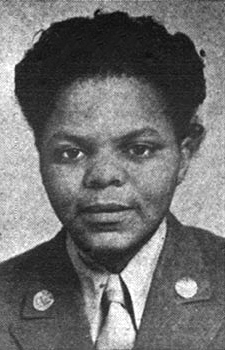Minnesota-born Virginia Lane was deeply rooted in North Minneapolis’ Black community. As a young girl, she attended Wayman AME Church, sang with her two older sisters, Luvenia and Harriet, as the Lane Sisters and graduated from North Community High School. She also won literary and art awards throughout the state for her writing. According to the Minneapolis Spokesman, Lane was the granddaughter of Ophelia Rice — one of the founders of Bethesda Baptist Church and a member of the Negro State Federated Women’s Club. Rice had arrived in Minnesota in 1864 through the Underground Railroad.

Minnesota Historical Society
Virginia Lane, circa 1944
In 1943, Lane enlisted in the U.S. Army Women’s Corps (WAC) with several Black women living in Minnesota, including Vernie Mae Smith, Bernice Eunice Huggar, and Elnora Alta Wallace. A few of these women lived in Rondo, a historically Black neighborhood in St. Paul. Lane completed basic training in Iowa before reporting to Walla Walla Air Force base in Washington state, where she was one of the first Black women assigned to the Air Corps.
In the fall of 1944, Lane returned from Iowa to visit her parents at 722 Fremont Ave. North in Minneapolis. Understanding the importance of Lane’s Army service, the Minneapolis Spokesman, Minnesota’s Black newspaper of record, interviewed Lane while she was on leave. Lane gave details about her military career and the activities she did with the little downtime that she had. She also reported winning a singles tennis championship for the WAC company stationed in Sioux City during training, winning a doubles championship with Pfc. Areatha Johnson, and announcing that she was crowned “Miss Section B” of the 224th WAC Battalion.
Two years after basic training, in February of 1945, Lane landed in Birmingham, England, after joining the 6888th Central Postal Directory Battalion, nicknamed the Six Triple Eight. The 6888th was responsible for processing a backlog of mail that contained letters, Christmas packages, and care packages from the U.S. The backlog of undelivered mail was creating morale issues for units on the European front, since soldiers needed mail delivery service to connect with family back home.
In 1940, residents of the northern English city of Birmingham had survived the devastating Battle of Britain. In 1945, Lane and the Six Triple Eight worked under the stress of frequent air raids in a bombed-out Birmingham schoolhouse. There “was scant heat and barely any light, as the windows had been painted black to avoid detection by the Luftwaffe.”
Despite being in an active war zone and being assigned an almost impossible mission, Lane and the all-Black 6888th produced outstanding results in Birmingham. With the new tracking system they created, the women processed an average of 65,000 pieces of mail per shift and cleared the six-month backlog of mail in three months.
Their work, however, was further complicated by racial segregation. During the formation of the WAC, Black and white women were segregated in the barracks. There were also attempts to segregate cafeteria halls, even though Black and white women trained together. Transport of Black WACs was also segregated, sometimes resulting in makeshift “colored only” railcars and waiting rooms in the South. When on leave in London, the Red Cross attempted to place the battalion in a separate hotel from white servicewomen, claiming that the “colored girls would be happier if they had a hotel all to themselves.” Major Charity Adams refused and “coordinated with Black troops stationed in London to ensure her soldiers stayed only in integrated hotels.”
When Lane was discharged from service in November of 1945, she received five medals: the European Theater of Operations ribbon, the WAC medal, the Good Conduct medal, the American Defense ribbon, and the Victory ribbon. In 1946 she married a fellow veteran: California native Arthur L. Frazier, recently returned from more than two and a half years of service in Europe.
The 6888th’s efforts during the war have created a lasting legacy. In 2022, President Joe Biden awarded the battalion the Congressional Gold Medal. In 2023, filmmaker Tyler Perry announced plans to produce a movie about the battalion that features their bravery in the face of war and racism.
Virginia Lane Frazier passed away in 2012 and was laid to rest at Fort Snelling National Cemetery.
For more information on this topic, check out the original entry on MNopedia.



